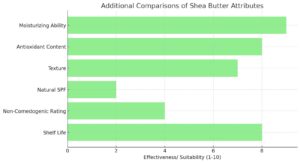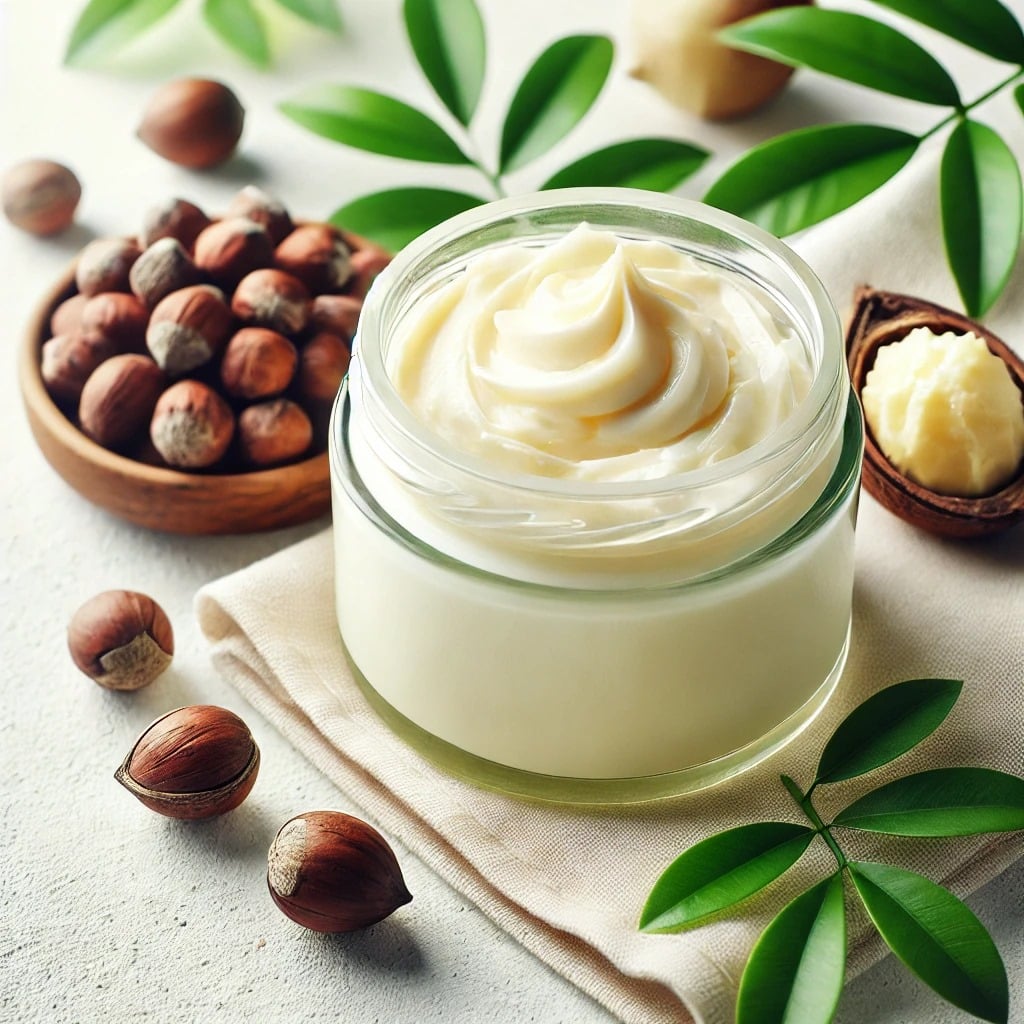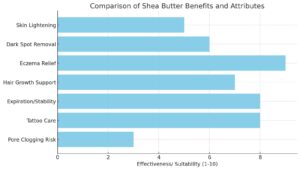10 Surprising Benefits of Shea Butter
1- Are Shea Butter Products Vegan?
Yes, shea butter products are typically vegan. Pure shea butter is derived from the nuts of the Vitellaria paradoxa tree, also known as the shea tree, which grows primarily in West Africa. Since it’s plant-based and involves no animal-derived ingredients or by-products, shea butter is suitable for vegan formulations. However, some shea butter products may contain non-vegan additives, so it’s best to check the ingredient list for other animal-derived ingredients like beeswax or lanolin.
2- Are Shea Butter and Mango Butter the Same?
No, shea butter and mango butter are different, though they have similar uses.
Source: Shea butter is extracted from the shea nut, while mango butter is obtained from the kernels of the mango fruit (Mangifera indica).
Texture and Consistency: Shea butter tends to be creamier and melts easily at body temperature, making it ideal for moisturizers. Mango butter is generally firmer, with a slightly grainier texture.
Benefits: Both butters are rich in fatty acids and vitamins, but shea butter is particularly high in vitamins A and E, which are beneficial for skin regeneration. Mango butter contains more oleic acid, which helps soften the skin and makes it suitable for drier skin types. While similar, their unique compositions give each butter distinct properties that cater to different skin needs.
3- Can Shea Butter Lighten Skin?
Shea butter is not a skin-lightening agent in the traditional sense (like ingredients such as hydroquinone or kojic acid). However, it is rich in antioxidants and vitamins, which can help to reduce hyperpigmentation over time by promoting a healthy skin barrier and reducing inflammation. Regular use of shea butter can improve skin texture and may give a more even tone, but it won’t directly lighten skin in the way that dedicated brightening agents do.
4- Can Shea Butter Remove Dark Spots?
Shea butter can aid in the appearance of dark spots due to its anti-inflammatory properties and its high vitamin A and E content. These vitamins are known to help promote cell turnover and may fade discoloration and scars over time. However, results vary widely, and shea butter is more effective as a skin barrier and moisturizer than as a targeted treatment for dark spots. For dark spots, products with active ingredients like vitamin C, glycolic acid, or niacinamide are often more effective.
5- Can Shea Butter Be Used for Eczema?
Yes, shea butter is often recommended for people with eczema because of its natural moisturizing and anti-inflammatory properties. Its fatty acids, such as linoleic, oleic, and palmitic acids, help repair the skin barrier, which is typically compromised in individuals with eczema. Additionally, shea butter’s ability to lock in moisture helps to soothe the itchiness and dryness associated with eczema. Dermatologists often suggest using shea butter as part of an emollient-based routine to manage eczema symptoms.
6- Can Shea Butter Expire?
Yes, shea butter can expire. Unrefined shea butter generally has a shelf life of 24 months, while refined shea butter can last longer if properly stored. To maximize its shelf life, store it in a cool, dark place, away from direct sunlight and extreme temperatures. Using it within the recommended time frame will ensure optimal benefits for your skin and hair.
7- Can Shea Butter Be Used for Hair Growth?
Shea butter can support hair growth indirectly. While it doesn’t stimulate hair follicles directly, its nourishing properties help improve scalp health by providing moisture and preventing dryness. A healthy scalp is essential for promoting optimal hair growth. Shea butter also helps to reduce breakage by strengthening hair strands, which can result in longer, healthier-looking hair over time. It’s especially beneficial for those with dry or curly hair types, as it can act as a natural emollient to keep hair moisturized and prevent split ends.
8- Can Shea Butter Go Bad?
Yes, shea butter can go bad. When exposed to air, light, or extreme temperatures, it can oxidize, which may result in an unpleasant smell and change in texture. To tell if it has gone bad, check for a sour smell, discoloration, or an unusual texture. Properly storing shea butter in a sealed container and away from direct sunlight will extend its shelf life. While it may not cause harm if used beyond its expiration, it may not provide the same skincare benefits.
9- Can Shea Butter Clog Pores?
Shea butter is generally considered non-comedogenic (rated around a 0 to 2 on the comedogenic scale), which means it is unlikely to clog pores for most people. However, some individuals with acne-prone or oily skin may find it too heavy for use on the face. For these skin types, using shea butter on the body rather than on the face is often recommended. Additionally, raw shea butter may work better than refined versions, as it retains more beneficial nutrients without additional chemicals.
10- Can Shea Butter Be Used for Tattoos?
Yes, shea butter is commonly used to care for tattoos. Its moisturizing properties help prevent dryness and itchiness, which are common during the tattoo healing process. Shea butter also provides a natural barrier that protects the skin without suffocating it, which is beneficial for healing. It’s important to use a thin layer, as too much can interfere with the healing process. Be sure to use a clean, unrefined shea butter without added ingredients that might irritate freshly tattooed skin.




